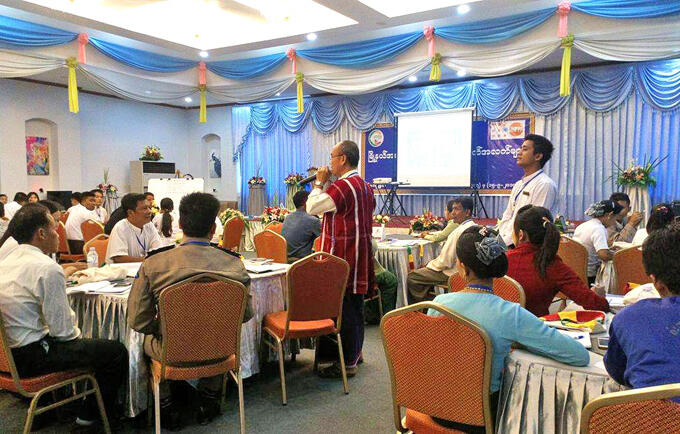“Nothing would be better than seeing many groups in communities come together and discuss for the common good” says U Yee Thant, a Senior Officer, Department of Immigration, Hpa-An District.
In the past, in places like Hpa-An in Myanmar’s Kayin State that are emerging from prolonged conflict, there was rarely an atmosphere that allowed for face to face interaction between local communities and government representatives. But a remarkable coexistence between previous adversaries emerges during the township workshop, facilitated by UNFPA, to discuss the local results from the 2014 Myanmar Population and Housing Census. U Yee Thant readily concedes that it was not easy to convince people and organizations to show up at a workshop, let alone share their opinions and questions. Yet, the census dissemination workshops held in Hlaingbwe, Myawaddy and Hpa-An townships have enabled and empowered both individuals and groups to discuss the census results and their implications for local priorities and planning.
The 2014 census was the first to be conducted in over 30 years. The results provide vital data for socio-economic planning, resource allocation, projection and decision-making across the country. Census dissemination workshops have been taking place in townships throughout the country to promote data utilization in local communities, supporting the participants to develop a better understanding of census data for their day-to-day activities.
A platform for peacebuilding
In Hpa-An as in other conflict-affected townships, the workshop dialogue is not just a discussion about policy and development, it also forms an additional platform for the ongoing reconciliation, civic engagement and peacebuilding. The workshops unfolded a place where everyone is included, and where everyone can work together despite divergent needs and interests.
During the workshops, government agencies, ethnic armed organizations, civil society organizations, youth groups and individuals worked on pragmatic issues of interest to all, such as education, employment, living conditions and healthcare. The census data provides a baseline for setting shared and consolidated goals for the township’s development, including peaceful coexistence.
Developing a blueprint for youth development
The data is very useful for approaching youth policy and planning. Now I understand how to use the data as a reference. By knowing the facts about our youth population, their education levels and their job situation here at the boundaries of Myanmar, we can develop a blueprint for youth development in our own community”, says Saw Sein Htwe from the Nyein Foundation, which is a peace building non-profit organization in Hpa-An.
“Before, many groups have shown little interest in coming together. But the census dissemination workshop attracted groups from all parts of our society. People even asked for more such workshops to be held in the future, and I hope that we can do something similar again”, says U Yee Thant.


